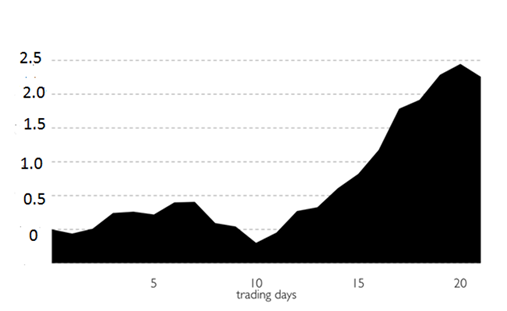Is a Santa rally guaranteed this December? Computer says 'yes'
28th November 2018 10:24
by Richard Hunter from interactive investor
Stockmarkets are struggling, but winter is typically a profitable time to be invested. Richard Hunter, head of markets at interactive investor, discusses the likelihood of a Santa rally this December.

Or at least it is if the last 20 years are anything to go by.
Rather than talk generalities, we looked to see whether there was any truth to one of the annual market clichés and, whereas going back a decade would simply have given us a clear run of a bull market, we went back another 10 years to provide more of a test.
The results are surprising.
Simply taking the December low of the FTSE 100 in the years back to 1998, and then comparing them to the high over the remainder of the month (as opposed to looking at the calendar month between the 1st and the 31st), the 'Santa Rally' happened every year - without exception.
Perhaps equally surprising was the length of the rally within the month. Taking 15 days as representing half of the entire month, the rally lasted more than half of the month 65% of the time. Indeed, in six of the 20 years the rally lasted 28 days or more – basically the entire month.
It appears also that the market likes to finish the year on a very positive note, with the highest point of the rally falling in the trading days between Christmas and the New Year in 19 of the 20 years, or 95% of the time.
The average Santa rally gain in December since 1998 is 5.8%, with the lowest gain being 2.5% in 2012 and the highest 12.2% in 2008.
Going back to 1984, the trend holds and is illustrated below. Alongside December being the best month of the year for returns, averaging a gain of 2% from the 1st to the 31st, the Santa rally kicks in around the middle of the month, as discussed above.

Source: Stock Market Almanac 2018
However…
While the numbers speak for themselves over the last 20 years, there is certainly no guarantee of a repeat in 2018, particularly given the current concerns which have added to volatility and made sentiment fragile.
Any slowdown in the burgeoning US economy will be pounced upon, whilst the Federal Reserve's tightening policy (likely to be proven further by another interest rate hike in December) and the escalating trade spat with China could both have detrimental effects.
Meanwhile, there are signs that the synchronised global economic recovery of the last couple of years has reached a plateau and, of course, the ongoing noise surrounding Brexit and its economic impact has made the UK, to quote one international investor, "uninvestable" at the moment.
At the time of writing, the FTSE 100 has been a poor performer in global terms over 2018, having given up 8.5% in the year to date. It is difficult to see a material change in that number as the year draws to a close.
There may be the usual annual reasons which lead to some buying pressure, such as investors (private as well as institutional) repositioning and perhaps investing in their preferred themes for the upcoming calendar year. Equally, this may result in additional cash finding its way into the market which, all things being equal, should be price positive.
Of course, investment is a long-term project and taking one month in isolation is not reflective of a patient strategy. It could also be argued that any 'Santa rally' is simply undoing previous weakness in the year – in 2018, for example, the average Santa rally of the last 20 years applied to the FTSE 100 would still leave the index 2.7% in the red for the year.
Even so, from a trading perspective, it could just prove to be one of those statistical anomalies which provide shorter-term (although higher risk) opportunities.
These articles are provided for information purposes only. Occasionally, an opinion about whether to buy or sell a specific investment may be provided by third parties. The content is not intended to be a personal recommendation to buy or sell any financial instrument or product, or to adopt any investment strategy as it is not provided based on an assessment of your investing knowledge and experience, your financial situation or your investment objectives. The value of your investments, and the income derived from them, may go down as well as up. You may not get back all the money that you invest. The investments referred to in this article may not be suitable for all investors, and if in doubt, an investor should seek advice from a qualified investment adviser.
Full performance can be found on the company or index summary page on the interactive investor website. Simply click on the company's or index name highlighted in the article.